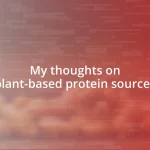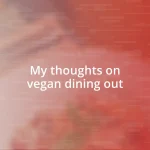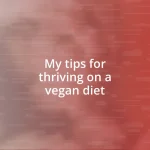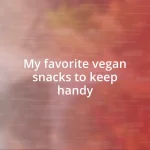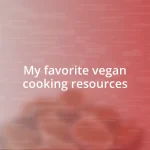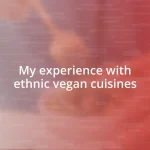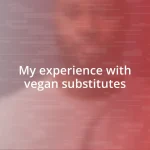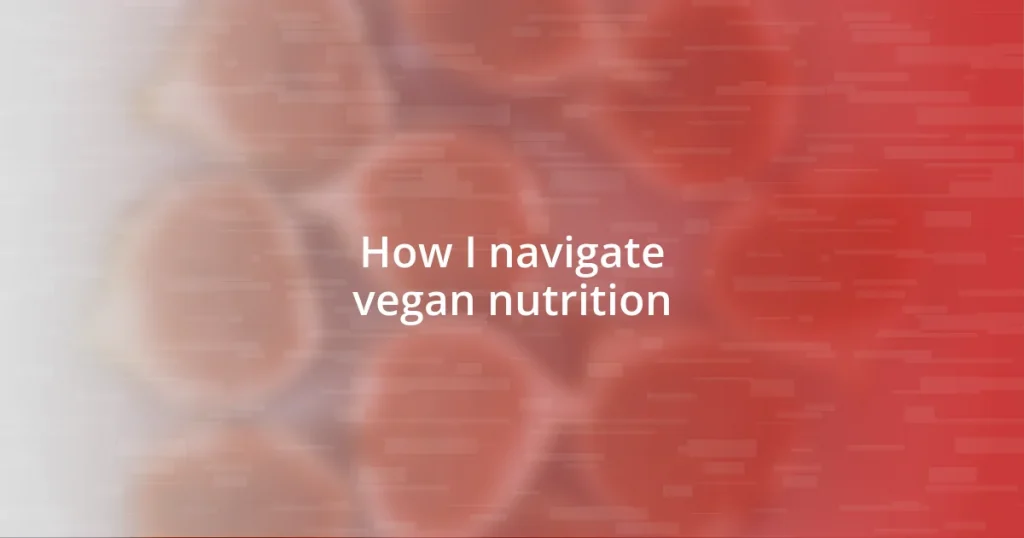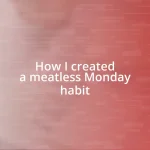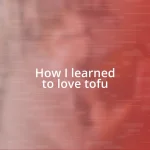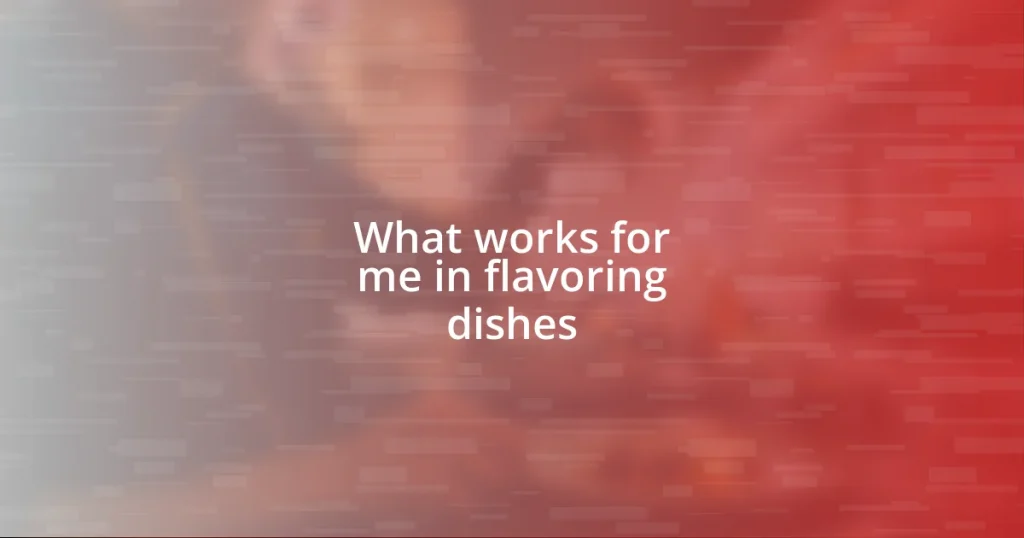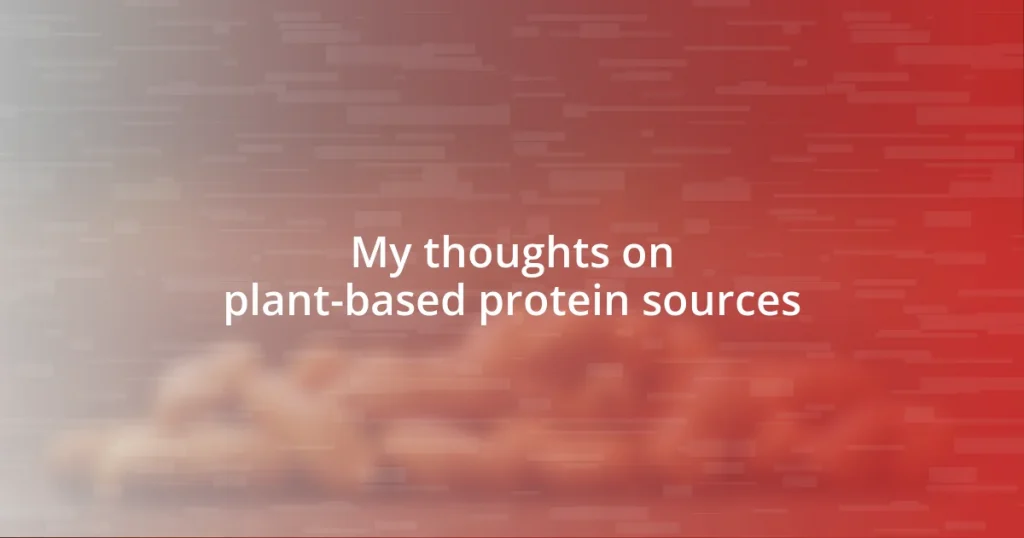Key takeaways:
- Understanding key nutrients like protein, iron, and vitamin B12 is crucial for a balanced vegan diet, emphasizing the importance of whole foods over processed snacks.
- Incorporating nutritional supplements such as B12, omega-3 fatty acids, and iron can help combat deficiencies and boost energy levels in a vegan lifestyle.
- Planning meals, being proactive when dining out, and utilizing reliable resources can enhance the vegan experience and support nutritional needs effectively.
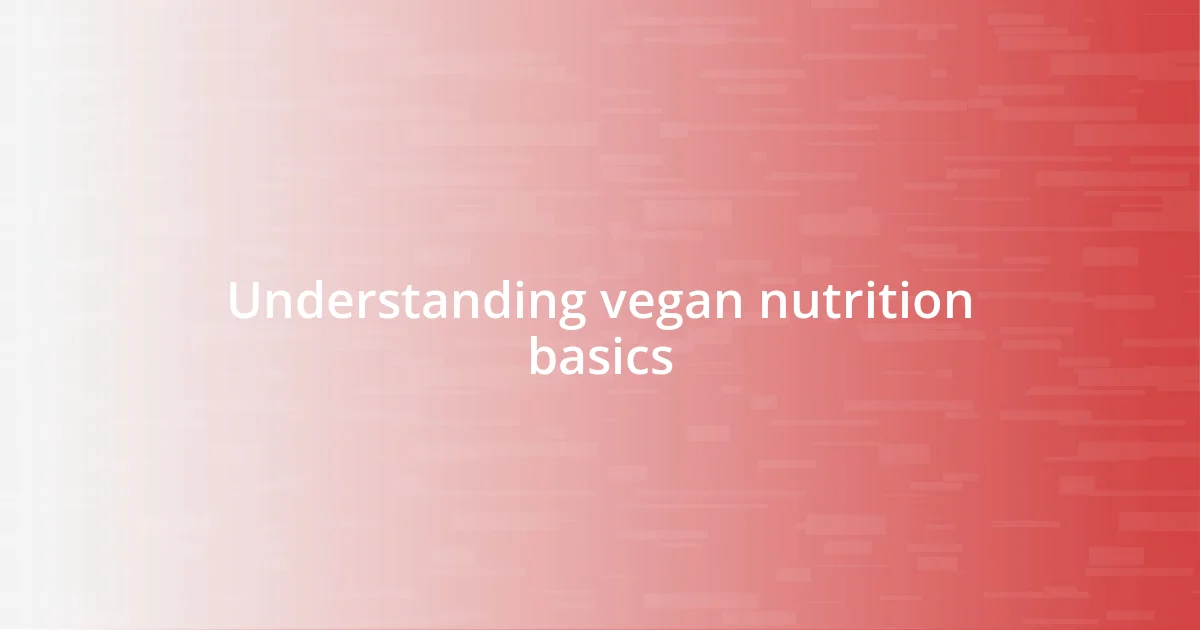
Understanding vegan nutrition basics
Vegan nutrition is more than just avoiding animal products; it’s about understanding how to adequately nourish your body. I remember the first time I went grocery shopping after making the switch; I stood in the aisle, overwhelmed by choices, wondering if I could really get all the nutrients I needed from plant-based sources. The truth is, once you learn about key nutrients like protein, iron, and vitamin B12, it becomes a lot less daunting.
A common misconception is that plant-based diets lack protein. I used to think that too, but I soon discovered a variety of plant sources—think lentils, chickpeas, and quinoa—that offer plenty of protein. Exploring these options not only made my meals interesting but also reassured me that I could meet my protein needs without resorting to meat.
I often emphasize the importance of balance and variety in a vegan diet. It’s easy to fall into the trap of relying on processed vegan snacks, but integrating a colorful array of whole foods makes all the difference. Have you ever noticed how vibrant fruits and vegetables can elevate your mood? Personally, whenever I fill my plate with a rainbow of produce, I feel energized and excited about what I’m eating!
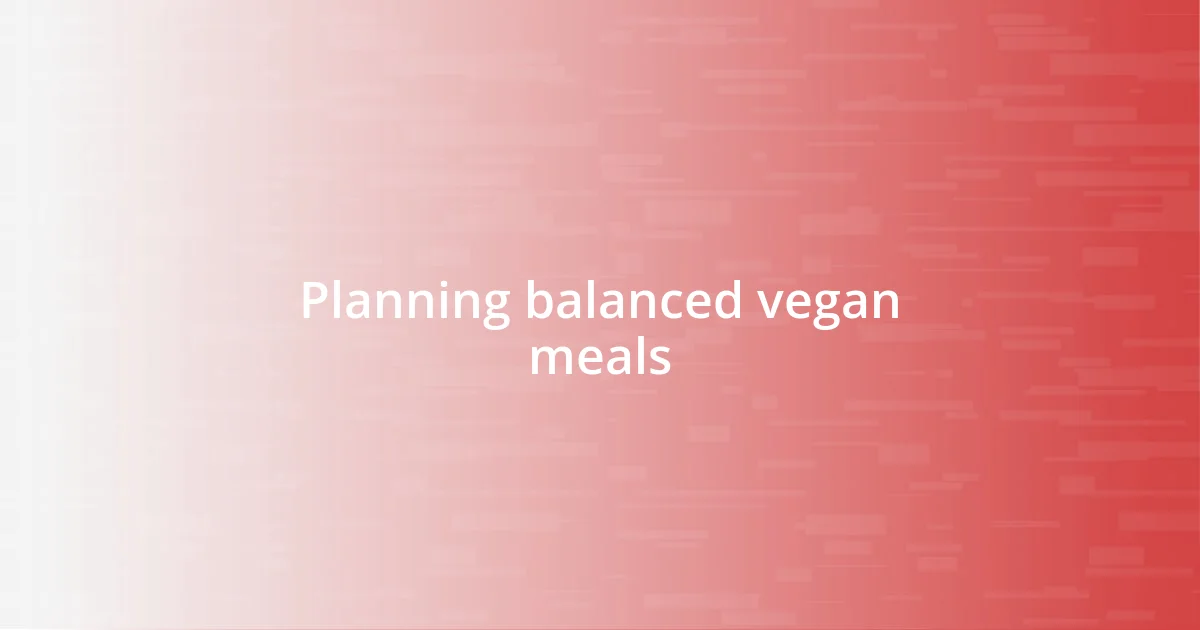
Planning balanced vegan meals
When planning balanced vegan meals, I always start by ensuring I include a good mix of protein, healthy fats, and carbohydrates. One of my go-to meals is a quinoa salad with black beans, avocado, and a variety of colorful veggies. It’s not just filling but also visually appealing, which makes the experience more enjoyable. I remember the first time I combined these ingredients; I thought I’d created a masterpiece.
It’s essential to pay attention to your micronutrients too, especially B12 and iron. I used to overlook these details, but once I started incorporating fortified foods and high-iron plant sources like spinach and lentils, I felt more energized throughout the day. This kind of mindfulness in meal planning can transform how you feel both physically and mentally.
Meal prepping has become a game-changer for me as well. I spend a few hours every weekend preparing grains, chopping vegetables, and cooking beans, so I have everything ready for the week. This approach not only saves time but relieves stress during my busy days. I’ve found that when I’m organized, I’m less likely to rely on unhealthy food options.
| Meal Component | Examples |
|---|---|
| Proteins | Tofu, chickpeas, lentils, quinoa |
| Healthy Fats | Avocado, nuts, olive oil, seeds |
| Carbohydrates | Whole grains, sweet potatoes, fruits |
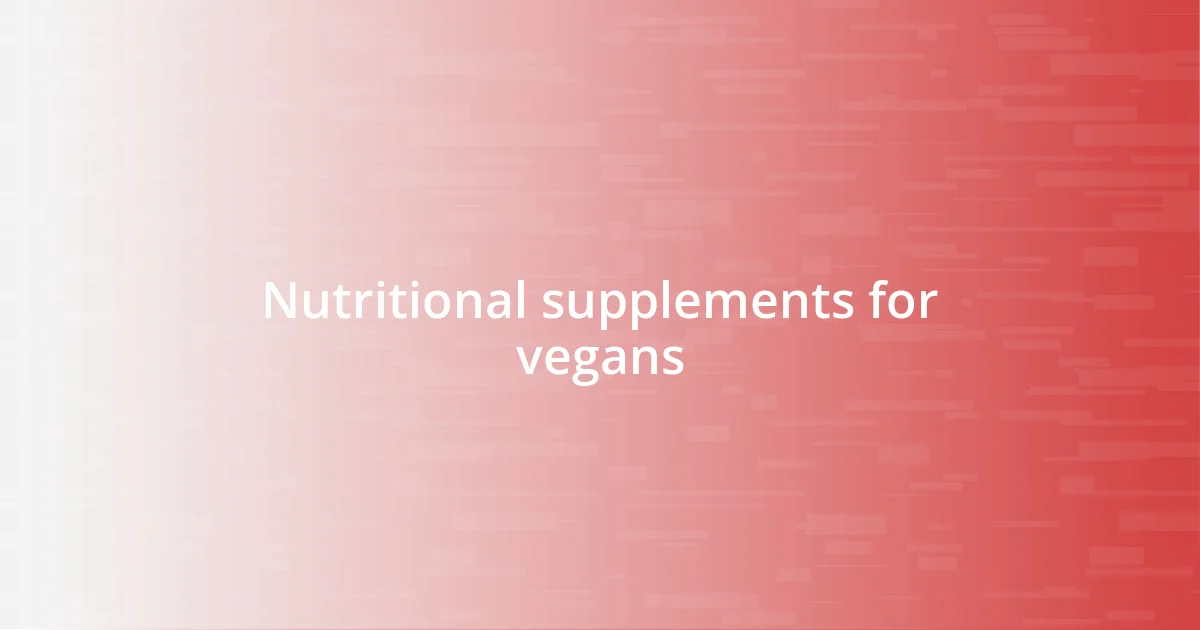
Nutritional supplements for vegans
When it comes to nutritional supplements for vegans, I’ve found them indispensable in my journey. Initially, I was skeptical, thinking that eating a varied plant-based diet should cover all my bases. However, after a few months, I noticed signs of fatigue and did some research that revealed the importance of supplements like B12 and omega-3 fatty acids. Once I started taking them, the boost in energy was remarkable.
Here are some crucial supplements to consider:
- Vitamin B12: Essential for energy production and neurological function; it’s mostly found in animal products, so a supplement is often necessary.
- Omega-3 Fatty Acids: Important for heart and brain health; I opt for flaxseed oil or algae-based supplements for my daily dose.
- Vitamin D: If you’re not getting enough sun, this one’s key for bone health.
- Iron: While you can get iron from plant sources, including a supplement can be helpful if you’re feeling low on energy.
- Zinc: This can support immune function; I’ve found that taking a zinc supplement helps keep my levels balanced.
Every time I take my supplements, I remind myself of the journey. It’s not just about fighting fatigue; it’s about thriving in my vegan lifestyle. I’ve learned to be proactive about my health, which has transformed my overall well-being.
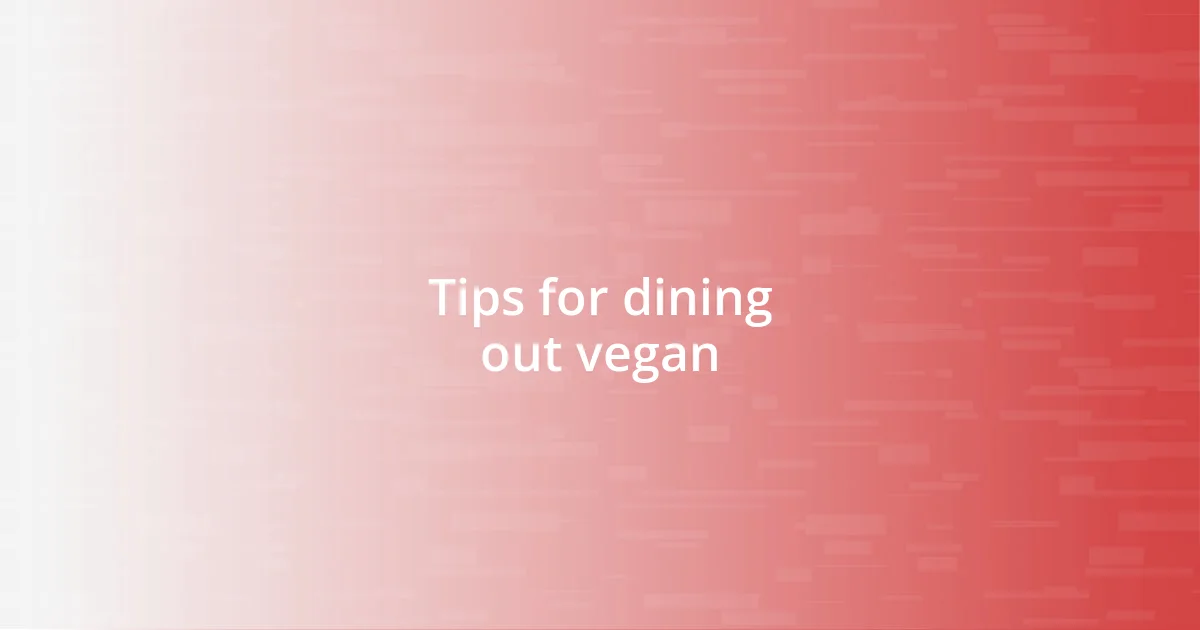
Tips for dining out vegan
When dining out as a vegan, I always make sure to check the restaurant’s menu online beforehand. This little preparation helps me avoid that awkward moment of scanning the menu while everyone else is already ordering. I remember a time I walked into a restaurant, starry-eyed, thinking I’d find plenty of options, only to be met with an overwhelmingly meat-heavy selection. It’s like stepping into an art gallery and only seeing black and white paintings—so disappointing!
Another tip I swear by is to be proactive and communicate with the staff. Don’t hesitate to ask questions about ingredients or request modifications. Just the other week, I was at a trendy new Italian place and found out they could make a scrumptious vegan risotto by simply swapping out the cheese for nutritional yeast. It felt empowering to take my dining experience into my own hands, and being open about my dietary choices led to a delightful meal I likely wouldn’t have stumbled upon otherwise.
Lastly, I’ve learned to embrace the idea of sharing plates. Tasting different dishes can make dining out more enjoyable and enlightening. On a recent date night, we ordered a variety of appetizers, and it turned into a mini vegan feast. I discovered unexpected flavor combinations that I now recreate at home. Isn’t it fascinating how food can bring people together? Sharing food not only broadens your palate but also creates a sense of community.
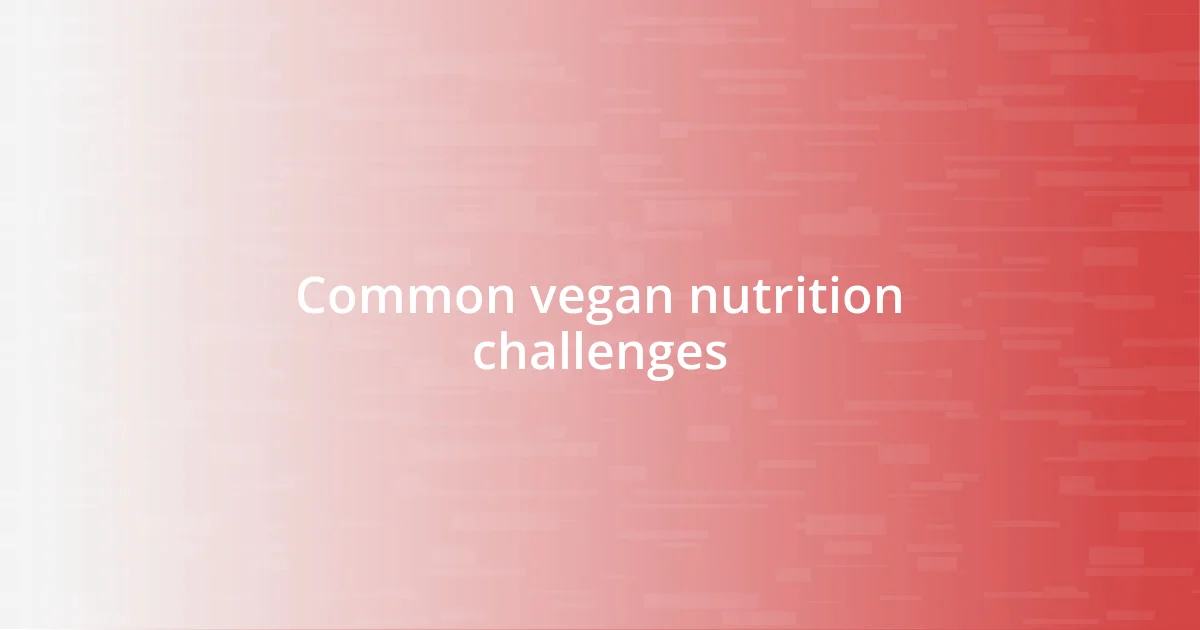
Common vegan nutrition challenges
Navigating vegan nutrition can feel like a double-edged sword at times. For me, one of the biggest challenges was ensuring I got enough protein. I remember early on, I anxiously counted every bit of lentils and quinoa, wondering if I was reaching my daily needs. It’s surprising how many protein myths persist, like the idea that only meat can fuel muscles. Now, I mix it up with tempeh, chickpeas, and even hemp seeds, which gives me confidence that I’m fueling my body right.
Another issue I’ve wrestled with is the propensity for nutrient deficiencies, especially with iron and calcium. I distinctly recall a time when I had a routine blood test and was shocked to see my iron levels were low. It was a wake-up call! Since then, I’ve made an effort to include more iron-rich foods in my meals, like spinach and fortified plant milks, while pairing them with vitamin C sources to boost absorption—an essential trick I learned from my nutrition research. Has anyone else experienced a similar wake-up call in their nutrition journey?
Finally, let’s talk about social situations, which can be downright tricky. I’ve had moments where I’ve shown up to a gathering only to find out the only vegan option is a sad side salad. I still chuckle at that memory! Now, I always bring a dish to share, turning the tables in my favor. By doing this, I not only satisfy my cravings but often inspire others to try something new. After all, who says a vibrant vegan dish can’t steal the show at a potluck?
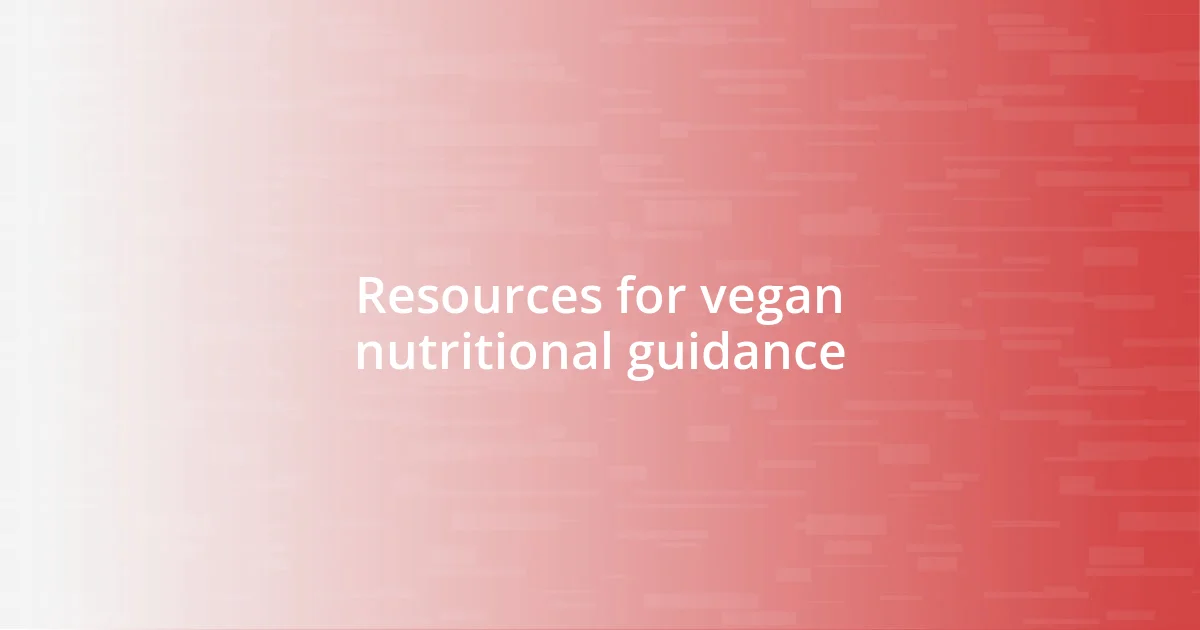
Resources for vegan nutritional guidance
When it comes to finding reliable resources for vegan nutritional guidance, I often turn to reputable websites like the Academy of Nutrition and Dietetics or the Vegan Society. Their information is always well-researched and written by professionals who understand plant-based diets inside and out. I once recommended these sites to a friend who was confused about getting enough nutrients, and it completely transformed her approach to vegan eating.
Books can also serve as invaluable guides. I love diving into works like “How Not to Die” by Dr. Michael Greger, which not only focuses on nutrition but also connects how food impacts our health in a broader sense. You get a sense of empowerment and the motivation to make better food choices. Have you ever had a book resonate so deeply with you that it changed your daily habits? I have, and it’s exhilarating to feel that shift.
Lastly, social media can be a double-edged sword for vegan guidance. While I love scrolling through Instagram for recipe inspiration, I urge caution regarding misinformation. I’ve fallen into the trap of following influencers who promote unrealistic health ideals. Now, I stick to accounts run by registered dietitians who share balanced, science-backed information. How do you navigate the abundance of information online? I find creating a curated feed helps me focus on credible advice without the noise.


